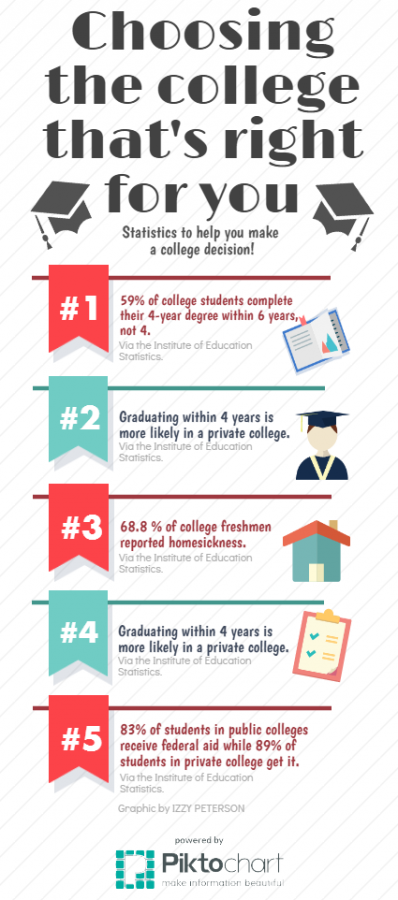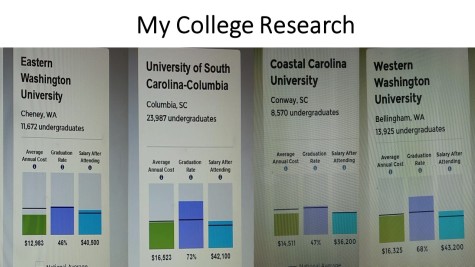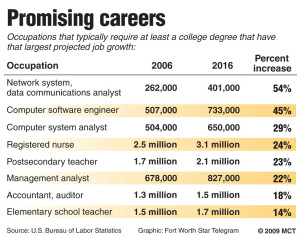5 things you shouldn’t overlook when choosing a college
May 7, 2015
In May, most seniors need to commit to their 4 year college. As a student who has had to face this challenge, there are a few things that I paid close attention to. Your own life-changing choice may become easier with the consideration of these five details about your future college.
- Class size/enrollment:
When a high school student starts looking at colleges and thinking about his/her future, one of the first questions he or she gets asked is, “Do you want to go to a big school or a small school?” While this is an important question, it isn’t addressing the most important of details. A more significant question one should ask is “Do you want to be in a classroom with a hundred other students?” or “Is knowing everyone’s name important to you?”
In larger schools, students have to compete to register for classes, qualify for their major of choice, and be pushier to stand out. “At a large school, it is a huge challenge to compete with others from around the world who are after the same major. Some people can’t handle that stress, so it’s important to look into how hard the school’s system is going to be in order to cope with it and prepare for success,” said Jacob Peterson, a former Virginia Tech student.
A small school, while lacking these stresses, can have downsides of its own. A lack of diversity in both classmates and majors is often the most prevalent.
“In a competitive field like journalism, it’s more important to choose a bigger school that has a major paper, TV studio and resources. Smaller schools may or may not have equally available job preparation,” said English teacher Natalie Rebetsky.
Both types of colleges have upsides, too! Larger schools may have more competitive athletics and a wider variety of clubs and Greek life. Smaller schools have a stronger sense of community and a setting to cultivate student/professor relationships. It all comes down to preference.
2. Graduation/Job Placement rate:
At every college, there is a percentage of the incoming class that will not graduate. While a freshman will think to herself, “I won’t be one of those, I’m different,” she could easily be wrong.
There are always multiple reasons for students dropping out of college: competitive majors, discouraging academics, financial issues. It may simply come down to attitude and the manner in which a student handles him or herself, but it is helpful to look.
The United States government has posted multiple statistics. Recently, the top lowest graduation rates in the country have been available for the public to see. Unless the school’s explanation for their low graduation rate is that students are taking over 4 years to get a degree, a low graduation rate is a major red light. You can find graduation rate statistics here.
In summary, definitely look out for a school with only a 50% graduation rate – you want to go with the college that has an 80% graduation rate instead.
A school’s job placement rate can also help to determine how easy it may be to find employment once you graduate. 16.8 recent college graduates are underemployed. Take a look at your potential schools’ job placement rates and hopefully you can avoid this situation along with the other 83.2%! A list ranking U.S. colleges by job placement rate can be found here.
Another tip – at college, surround yourself with others who are looking to succeed. Their positive attitude towards doing well in class and graduating can help you maintain a similar attitude.
- Professors’ credentials:
It is critical that a student forge a strong connection with his or her professors. These relationships can often be beneficial to the student’s future and lead to an internship or job that can get a student started in the real world.
A professor’s information and short bio can be found on most college websites, and it is a good idea to check who will be leading your major’s department and teaching the classes you will have to take. For instance, working artists are a good thing to find in a school’s art department and a biologist who has worked in the field is optimal as he/she can often lead to connections with others in the field.
If you are looking to forge a good relationship with your professors, each semester try to arrange a meeting with them when classes start. Ask them what they expect from students and what you should do in order to excel in class. This will establish you as different from the rest of the students in the professor’s class.
Look out for a college’s number of adjunct teachers and graduate teaching assistants – this is important because adjunct professors, for instance, are only a part-time employee of the college and may not be as readily available to help students.
- Location/Safety:
Coming out of high school, a lot of students are eager to get as far away from home as possible. Others may want to stay close to their families and have the ability to visit home when they want. Think about which of these situations will suit you best as you learn to live in the college environment.
You might miss your family more than you may think so perhaps a school closer to home will do you good. Schools farther away may have shuttles available to take you close to home or you may need to find somebody to pick you up or carpool with you if they live in the same general area. According to the Institute of Education Sciences, 68.8 percent of students reported experiencing homesickness.
Another thing that factors into a school’s location is its proximity to a town/city. This determines if students can easily access grocery stores and things like malls, movie theaters, and restaurants. If off-campus life isn’t much of a worry for you, then this isn’t really an issue.
A huge factor in choosing a school is not just its location. The level of safety and security is also important. The majority of colleges throughout the country now employ the blue light system: devices can be found at the bottom of poles with which a person can make immediate contact with the police. These boxes are frequently used when people are feeling uncomfortable or in danger. It has helped a lot with on campus crimes such as rate, theft, and assault. According to a New York Times article, on the Ohio State campus the number of sex crimes have gone from 32 to 12.
Just try to pick the school whose surroundings will make you happy – you don’t want to spend four years in a place that won’t suit your needs.
- Grants and scholarships
One of the biggest issues students run into when it comes to getting a degree is money. This issue can seem easily solved when the school offers grants and loans. Sometimes a student may not look at the details closely enough, however. Is the grant renewed each year? What are the college’s rules when it comes to paying off loans? Do the grants/loans cover the entire school year? How much money will you owe once you get your degree?
Call or email the financial advisers of the schools you are considering – they can give you advice on ways to pay off loans and how the school can help you along the way. They can also explain to you the differences between the types of grants and loans. It is important to remember that scholarships and grants are not something you need pay back – the loans are the things you really need to pay attention to.
Look into the interest rates on different loans. There is a bigger difference between a loan with 5% interest and one with 10% than you may realize. The school that can offer you the most substantial amount of financial aid may be the best option as long as they offer the opportunities you are seeking in your college experience.
In terms of loans and grants for private schools vs. public schools, according to the National Center for Education Statistics, the percentage of students attending public 4-year institutions who receive federal aid is 83%. At private, it is 89%. Some facts about federal aid can be found here.
Where scholarships are concerned, merit scholarships can also be helpful to help pay for college. Smaller schools are usually very generous when it comes to these, helping to take a chunk out of your tuition. This is not always the case, but keep it in mind before you dismiss the college with the expensive tuition, they may be willing to compensate more than you think.














